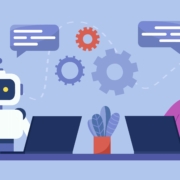Chatbots are here to stay
CHATBOTS ARE HERE TO STAY
Paul Magnuson & Beth Dewhurst
It is impossible to keep up with the flood of blogs, podcasts, and scholarly articles about ChatGPT. Provocative article titles and opinions like The College Essay is Dead (Marche, 2022) and The End of High School English (Hermon, 2022) have helped drive current interest, as has the quick and easy access to test the chatbot oneself.
ChatGPT is amazing, producing decent, if formulaic, text quickly. Stephen Marche (Frankel, 2023) thinks the texts it produces are solid high school Bs, banal but formulaic like much of the writing required in high school. He also claims that the product of some other text generators may outperform ChatGPT, or will outperform ChatGPT as the technology advances. Whatever is best, however best be defined, will likely be eclipsed by newer versions that perform what they are designed for that much better. You get the picture. AI generated text is here to stay. What astounds us today is going to look a bit amateurish tomorrow.
Predictably, many early reactions to ChatGPT include fear and a tendency to exaggerate the possible impact AI written text will have on curriculum, instruction, and assessment (Kovanovic, 2022; Spencer, 2022). We are curious whether or not current plagiarism tools will be able to detect text written by chatbots (Mollenkamp, 2022) and, the technology being new, we are even asking if using a chatbot is plagiarism (Frankel, 2023). After all, it is not misrepresenting the writing of another person as one’s own.
If it’s true that “the product a student provides may no longer provide genuine evidence of their achievement of the course outcomes” (Kovanic, 2022), something has got to give. Many schools and districts will decide that the best approach is to block the technology, an approach taken by the New York City Education Department (Chalkbeat, 2023). This strikes us as unrealistic, however, since student access to technology extends far beyond the control of a school or district. “But banning ChatGPT is a bit like mandating abstinence-only sex education,” writes Sarah Dillard. “It may be well-intentioned, but it’s not going to be effective, and it’s certainly not going to prepare students for the real world” (2023).
Alternatively, our current educational practice may need to change and adapt. Perhaps chatbots are “exposing the essential problems with student writing and writing instruction in K-16 education” (Thomas, 2022). Thomas continues:
“If AI-generated writing can produce passages or even entire essays that meet the expectations of assignments in K-16 education, we shouldn’t be flailing our arms and racing around in Apocalyptic panic because that is a signal that the type of writing students are assigned and the writing they are taught to produce weren’t very good to begin with.”
How then do we propose to leverage chatbot technology for the good of instruction?
One suggestion is that teachers will “use ChatGPT essays as examples of mediocre writing that they’ll assign their students to edit and improve” (Coleman, 2022). Some form of this approach seems plausible, at least until the technology is no longer mediocre, and we would wager that the technology is already good enough to make distinguishing banal chatbot writing and formulaic student writing both time consuming and counterproductive. More realistic is perhaps to embrace the technology, meaning the use of “… AI tools to conduct subject-domain tasks should be part of the educational goals in the future. Education should focus on improving students’ creativity and critical thinking rather than general skills” (Zhai, 2022, p. 10).
Some pedagogical purposes might include using chatbots to generate discussion about themes, to develop argumentation, and to generate ideas in creative writing (Parker, 2022). Marche mentions a friend who is generating children’s stories in a foreign language that his child is learning, based on types of characters and storylines the child likes (Frankel, 2023). Instead of using school materials made for a general audience, this father is creating personalized materials. Perhaps that example hints at school materials of the future, how they are created, and how they support motivation and differentiation.
Thomas (2022) suggests that “a key way to encourage student engagement in writing and learning to write is to de-grade the writing process,” a sentiment echoed by Frankel (Frankel, 2022) and Zhai (2022), who suggests that “educators may have to consider innovative formats of assessments, particularly those that could carry out creativity and need critical thinking” (p. 10). Perhaps the ability of AI to write an essay will actually improve assessment, and therefore teaching?
Stephen Marche sees opportunity in AI created text. While the chatbot is trained in such a way that “answers can come across as natural-sounding and human-like,” Hurst (2022) feels that a tool like ChatGPT is currently best at “banal answers” (Frankel, 2023) and that humans are not likely to be replaced, nor will there be no need to teach writing. Banal writing, as he calls it, is unfortunately “how so much of our education is driven toward,” but here there is cause for optimism. If we need to teach what the chatbot cannot do, it is time then to change teaching and learning so that we are not focusing on banal writing. Paraphrasing what his son had to say about the chatbots influence on teachers and schools: Instead of teaching you how to write like a machine, they’re going to have to teach you to write like a human being.
At least for now.
References
Chalkbeat. (2023), January 6). Communications of the ATM. NYC Education Dept. Blocks Chatbot on School Devices, Network. https://cacm.acm.org/news/268457-nyc-education-dept-blocks-chatgpt-on-school-devices-networks/fulltext#:~:text=Blocks%20ChatGPT%20on%20School%20Devices%2C%20Networks,-By%20ChalkBeat&text=New%20York%20City%20students%20and,networks%2C%20agency%20officials%20confirmed%20Tuesday.
Coleman, C. (2022, December 19). Forbes. ChatGPT Gives Writing EdTech Its Moment. https://www.forbes.com/sites/colettecoleman/2022/12/19/chatgpt-gives-writing-edtech-its-moment/?sh=6351ca9552c1
Dillard,S. (2023, January 4). The 74. Schools Must Embrace the Learning Disruption of ChatGPT. https://www.the74million.org/article/schools-must-embrace-the-looming-disruption-of-chatgpt/
Frankel, B. (Host). (2022, December 12). How will AI Affect Education? Part 1 (No 89) [Audio podcast episode]. In Overthrowing Education. https://www.overthrowingeducation.com/episodes/episode-89-how-will-ai-effect-education-part-1
Frankel, B. (Host). (2023, January 9). Stephen Marche: How will AI Affect Education? Part 2 (No 91) [Audio podcast episode]. In Overthrowing Education. https://www.overthrowingeducation.com/episodes/episode-91-stephen-marche-how-will-ai-affect-education-part-2
Hermon, D. (2022, December 9). The End of High School English. The Atlantic. https://www.theatlantic.com/technology/archive/2022/12/openai-chatgpt-writing-high-school-english-essay/672412/
Hurst, L. (2022, December 15). Euronews.next. ChatGPT: Why the Human-Like AI Chatbot Suddenly Has Everyone Talking. https://www.euronews.com/next/2022/12/14/chatgpt-why-the-human-like-ai-chatbot-suddenly-got-everyone-talking
Kovanovic, V. (2022, December 15). The Conversation. The Dawn of AI Has Come, and Its Implications for Education Couldn’t Be More Significant. https://theconversation.com/the-dawn-of-ai-has-come-and-its-implications-for-education-couldnt-be-more-significant-196383
Marche, S. (2022, December 6). The Atlantic. The College Essay is Dead. https://www.theatlantic.com/technology/archive/2022/12/chatgpt-ai-writing-college-student-essays/672371/
Mollenkamp, D. (2022, December 21). Can Anti-Plagiarism Tools Detect When AI Chatbots Write Student Essays? https://www.edsurge.com/news/2022-12-21-can-anti-plagiarism-tools-detect-when-ai-chatbots-write-student-essays
Parker, K. (2022, December 8). ChatGPT Could Be Writing Students’ Homework. Tes Magazine. https://spencerauthor.com/human-skills/
Spencer, J. (2022, December 9). Human Skills in a World of Artificial Intelligence. https://spencerauthor.com/human-skills/
Thomas, P. L. (2022, December 15). It’s the End of Writing as We Know It, and I Feel Fine. https://radicalscholarship.com/2022/12/15/its-the-end-of-writing-as-we-know-it-and-i-feel-fine/
Zhai, X. (2022, December). ChatGPT User Experience: Implications for Education. https://www.researchgate.net/publication/366463233_ChatGPT_User_Experience_Implications_for_Education
Paul Magnuson is the educational research director at Leysin American School. He is also an instructor at Moreland University and a frequent blogger for The International Educator. Paul consults in the areas of innovative teaching and learning, agility, out-of-the-box language instruction, and self-directed professional learning.
Beth Dewhurst serves as a faculty member and mentor in Moreland University‘s TEACH-NOW online K12 certification and master’s of educational technology programs. She is also a freelance ed tech consultant and recently contributed to EVERFI’s WordForce, a free literacy K2 adventure. In 2017, Beth was named Washington, D.C.’s State Teacher of the Year for her tech-based teaching and family engagement during her 15+ years as a DC Public Schools reading intervention educator. Her EdD in EdTech and current research explores how technology can connect learners, families, and educators for equitable learning access and literacy success.




